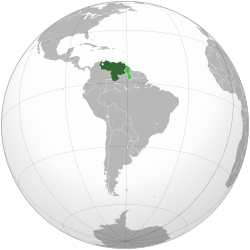
Back جمهورية فنزويلا (1953–1999) Arabic República de Venezuela (1953-1999) Spanish République du Venezuela (1953-1999) French República da Venezuela (1953-1999) Portuguese Четвёртая республика Венесуэла Russian Četvrta Venezuelanska Republika Serbo-Croatian 委内瑞拉共和国 Chinese
This article needs additional citations for verification. (December 2015) |
Republic of Venezuela República de Venezuela (Spanish) | |||||||||
|---|---|---|---|---|---|---|---|---|---|
| 1953–1999 | |||||||||
| Motto: "Dios y Federación" (Spanish) | |||||||||
| Anthem: "Gloria al Bravo Pueblo" | |||||||||
 | |||||||||
| Capital and largest city | Caracas | ||||||||
| Official languages | Spanish | ||||||||
| Religion | None (around 92% Roman Catholic) | ||||||||
| Demonym(s) | Venezuelan | ||||||||
| Government | Federal presidential constitutional republic initially under a military dictatorship (1953–1958) | ||||||||
| President | |||||||||
• 1953–1958 | Marcos Pérez Jiménez | ||||||||
• 1959–1964 | Rómulo Betancourt[1] | ||||||||
• 1964–1969 | Raúl Leoni | ||||||||
• 1969–1974 | Rafael Caldera | ||||||||
• 1974–1979 | Carlos Andrés Pérez | ||||||||
• 1979–1984 | Luis Herrera Campins | ||||||||
• 1984–1989 | Jaime Lusinchi | ||||||||
• 1989–1993 | Carlos Andrés Pérez | ||||||||
• 1993–1994 | Ramón José Velásquez | ||||||||
• 1994–1999 | Rafael Caldera | ||||||||
• 1999 | Hugo Chávez | ||||||||
| Legislature | Bicameral Congress | ||||||||
| Senate | |||||||||
| Deputies | |||||||||
| History | |||||||||
• Established | 11 April 1953 | ||||||||
| 16 January 1961 | |||||||||
| 2 February 1999 | |||||||||
| Population | |||||||||
• Estimate | 8,142,838 | ||||||||
| HDI (1999) | 0.674[2] medium | ||||||||
| Currency | Bolívar | ||||||||
| ISO 3166 code | VE | ||||||||
| |||||||||
The Republic of Venezuela, also sometimes referred to as the Fourth Republic of Venezuela, was a democratic republic first established in 1953, and replaced in 1999 by the Bolivarian Republic of Venezuela. Venezuela saw ten years of military dictatorship from 1948 to 1958. After the 1948 Venezuelan coup d'état brought an end to a three-year experiment in democracy, a triumvirate of military personnel controlled the government until 1952, when it held presidential elections. These were free enough to produce results unacceptable to the government, leading them to be falsified and to one of the three leaders, Marcos Pérez Jiménez, assuming the Presidency. His government was brought to an end by the 1958 Venezuelan coup d'état, which saw the advent of democracy with a transitional government under Admiral Wolfgang Larrazábal in place until the December 1958 elections. Prior to the elections, three of the main political parties, Acción Democrática, COPEI and Unión Republicana Democrática, with the notable exclusion of the Communist Party of Venezuela, signed up to the Puntofijo Pact power-sharing agreement.
This period was characterised by the alternation of political power established in the Punto Fijo Pact; by the nationalisation of the oil industry in 1976 and the creation of PDVSA, the national oil and gas company; and by the rise of new social elites. Internationally, Venezuela became a founding member of the Organization of the Petroleum Exporting Countries (OPEC). The 1980s in particular were characterised by the flowering of art and culture and by the artistic development of the nation, especially in television. Pioneering media like RCTV made Venezuela famous with soap operas such as Kassandra.
- ^ First democratic President
- ^ "Human Development Report 1998" (PDF). hdr.undp.org.


